Startups should consider scaling their operations, including their CRM software, as they expand their customer base in the shortest possible time. Often, startups are notorious for a fast burn rate. Hence, they should make sure their initial purchases are worth every dollar.
When thinking of a good CRM, startups need to think of scale and pricing. They should look for features that can grow with their needs. The last thing you want is to migrate to another system because your old CRM cannot keep up with you.
In this guide, we are listing CRM software for startups, comparing their features, pricing and their value propositions to fast-growing companies.

What are the leading CRM software for startups in 2026?
The CRM software market is expected to grow to $129 billion by 2028, as businesses adopt more personalized, engaged customer relationships for a more stable revenue stream. No surprise there, as studies, including one from the net promoter score inventor, have shown that increasing customer retention rates increase profits.
Customer retention also works even if you have a small customer base. In fact, you should start thinking of using CRM to lay down a solid foundation in the next few years, as you expect to exponentially grow the business. With a good CRM campaign, you can keep building on your past efforts instead of starting things from scratch every time you lose customers.
At the end of it, customer relationships are all about managing your revenue growth. With a good CRM, you get to increase sales quota, improve team efficiency and increase leads, all aligned with your business goal.
Source: IBM CRM Studies
Leading CRM Software for Startups in 2026
1. HubSpot

Topping our list of CRM software for startups, HubSpot is a suite of integrated apps for sales, marketing and support that are sold separately, but together, they give you a solid CRM infrastructure. Sales, marketing and support teams use CRM to consolidate their activities and collaborate on helping push leads to conversion.
The best part of it, you get to set up a working CRM for free. That’s a great deal for startups looking to build a comprehensive sales pipeline without the enterprise cost. Should the need to expand the business presents itself, they simply scale to advanced CRM features via subscription, where they only pay for the features they need. Advanced features include omnichannel marketing automation, video hosting and management, campaign management and website analytics.
Meantime, startups can leverage the free CRM, which has robust enough features to create marketing-sales funnels, log sales activities and save contact details. At no cost, you can organize and consolidate contacts up to a million entries, deals and sales tasks and activities in one place. By linking these records (contacts, deals, and sales activities) with each other, marketers can contextualize, personalize and track each deal with greater visibility.
The free CRM also includes standard marketing tools like forms, landing pages, email marketing, ad management and a shared inbox. Likewise, startups get to use the free app’s sales tools such as live chat, team email, basic bots, quotes and call features.
Support and operations tools are also thrown in for free. You get ticketing, email scheduling, data sync, historical sync, default field mappings and app integrations.
HubSpot CRM allows for unlimited users at no cost. However, adding contacts in the free app may affect the pricing if you’re subscribed to HubSpot Marketing Hub, which is billed by increments of 1,000 marketing contacts.
Detailed HubSpot Smart CRM Review
2. Pipedrive

Pipedrive is a sales CRM with a strong focus on pipeline management. It is designed around salespeople’s workflows and use cases in both small business and enterprise companies. Users can customize the software along their sales stages and move deals across stages without losing the context.
Pipedrive gives you a single location to check and reply to emails, schedule phone calls and, overall, monitor activities and statuses of deals at every stage of the pipeline.
Additionally, the software allows you to automate tasks, collect contact details with a single click and further customize the workflow through webhooks or open API.
With the built-in analytics, you can generate reports to monitor key metrics like new deals, win-loss rate, recurring revenue and average deal age. You can also customize fields and set up analytics around your product, team or overall business.
Other key features include an AI-powered sales assistant, a lead booster and a marketplace of apps you can integrate with Pipedrive.
Subscriptions start at $12.50 per user/month, billed annually.
Detailed Pipedrive Review
3. NetSuite CRM

NetSuite CRM builds on the foundation of the vendor’s ERP system, enabling sales and marketing teams to gain a holistic view of their customers. It suits small business and enterprise CRM requirements, leaning towards businesses with more complex needs.
In particular, companies managing global sales will appreciate the software’s powerful features. These include sales force automation, sales performance management, order management, marketing automation and partner management.
Overall, NetSuite CRM streamlines your lead-to-conversion rate, boosting the bottom line. You can automate multichannel campaigns and lead capture, track each online engagement with prospects and customers for opportunities, and quickly convert quotes into sales orders.
The software’s reporting & analytics, meanwhile, provides you with real-time dashboards of sales, marketing and support performance insights. NetSuite’s advanced analytics also allows you to generate more accurate sales forecasting.
NetSuite CRM also features advanced modules for campaign management, time tracking and knowledge management.
Pricing is quote-based to help you bundle the right feature set.
Detailed NetSuite CRM Review
4. Salesforce CRM

Beyond its reputation as a pioneering industry benchmark in cloud solutions it has built around its sales and CRM software, Salesforce CRM is known for its features that are designed to help companies generate more leads, close more deals and retain more customers. The features are rooted in providing a single view of customer details and interactions to drive leads across your marketing and sales pipelines.
A guided setup is available to help marketers deploy in minutes a CRM workflow that adapts to their sales stages. Having a single CRM pipeline helps you streamline the sales process, giving sales reps, service reps and key users quick access to customer data and tools for consistent interactions with customers and prospects.
With a consolidated CRM pipeline, sales, marketers and support agents also get to personalize customer messaging even for companies with a huge customer base.
In addition, an indirect but key benefit to using Salesforce CRM is, you get to integrate customer data with the Salesforce ecosystem, which includes tools for ecommerce, business intelligence and customer service. Thus, outside of sales, marketing and support, all customer-engaging teams like IT and order fulfillment and management get a full and updated context of your customers.
Salesforce CRM plans start at $25 per user/month.
Detailed Salesforce CRM Review
5. monday.com CRM

monday.com is a task management software that has since evolved into a “work OS” that is ideal for a range of uses cases—CRM being one. Its flexibility to adapt to different workflows makes the software an ideal startup tech tool, where a new company might pivot to a new business model midway. With over 30 column types, a monday.com board can be configured in myriad ways.
As a CRM software, monday.com helps you manage customer lifecycle by consolidating relevant data, files and conversations in a central workspace that is collaborative, highly visual and easy to access.
Different users can track customer details and statuses more easily, so the whole team stays on the same page. Cumbersome administrative tasks like moving leads across stages can be automated with rule-based triggers, thereby streamlining your sales cycle.
monday.com also lets you embed a contact form on your web page, and funnel the details directly to your contact list. The contact details are automatically added to the CRM.
Other key features include custom notifications, document management, quick lookups, and live comments on visuals.
monday.com has a free plan. For advanced features, pricing starts at $24 per user/month.
Detailed monday.com Review
6. CRM Creatio
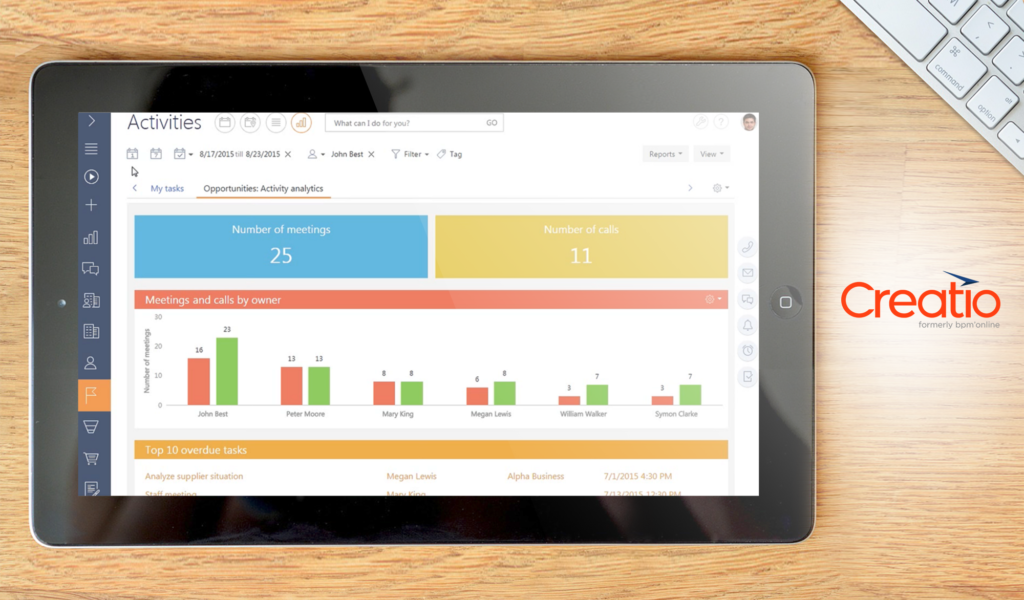
CRM Creatio is a sales automation software that helps you automate workflows and build apps with no-code tools for a CRM strategy. Startups with advanced CRM requirements will find Creatio useful to structuring their business around customer-oriented processes and operations.
The software allows you to set up a unified ecosystem of information, tasks, conversations, files that teams from sales, marketing, IT, and support and management use as a single-source customer data bank.
CRM Creatio features marketing tools to help you organize segments and orchestrate buyer journeys across multiple channels. You get to personalize messages and accelerate the conversion from leads to customers to relationships.
As a sales management platform, the software gives reps a 360-degree view of customer profiles, the better to keep track of deals and opportunities and focus on promising leads.
Using the platform, support teams also benefit from having a holistic customer view, which enables them to address issues in context.
CRM Creatio integrates with MS Exchange, Google Maps, LDAP, IM, AP and a whole range of business apps.
The vendor offers separate sales, marketing and service modules that you can bundle up for a CRM tech stack, the pricing of which comes via a quote.
Detailed CRM Creatio Review
7. Freshsales
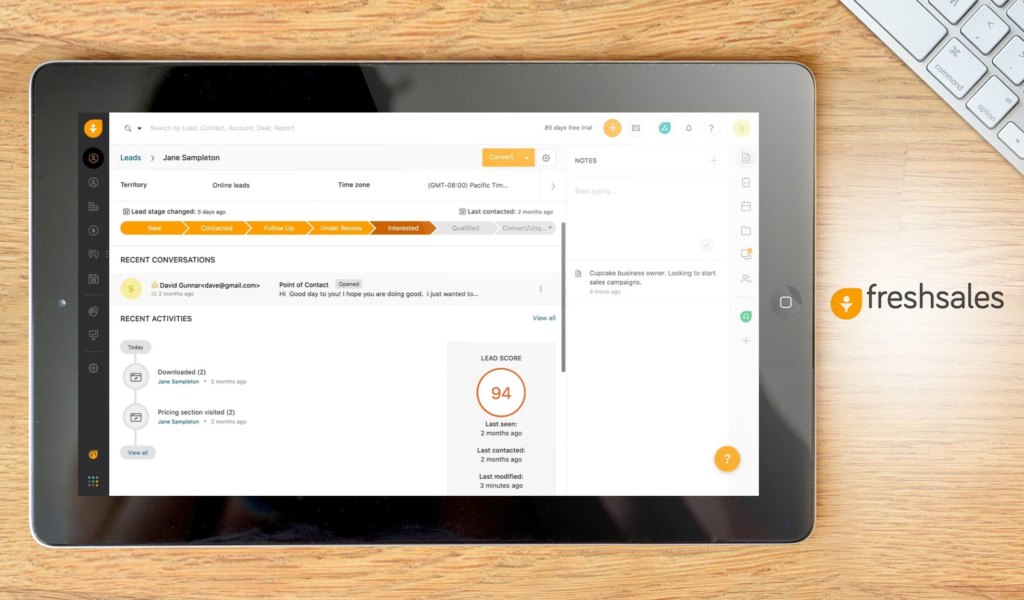
Freshsales, formerly Freshworks CRM, has a free app and scalable price tiers that are ideal for growth-oriented startups. The free app includes contact and account management, customer lifecycle stages and built-in chat, phone and email features, while paid plans scale to advanced features that also include AI-powered analytics and CPQ.
You can track customer interactions across sales stages and follow up opportunities for long-term relationships. You also get to design campaigns or sales strategies with greater context based on customer engagement, the details that the software’s Activity Timeline and Lifecycle Stages features can consolidate in one place for a 360-degree customer view.
Freshsales also features predictive contact scoring to help you focus on high-value prospects. Meanwhile, another functionality allows you to autofill contacts’ social and public details, thereby enriching your database.
As for deal management, you get to trigger automatic actions, greatly streamlining the sales cycle. You can also forecast revenue and analyze win-loss probability using the software’s AI-powered analytics.
Cloud telephony is included, allowing sales reps to place calls, log notes and record conversations inside the app.
Paid subscriptions start from $15 per user/month.
Detailed Freshsales Review
8. Zoho CRM

Zoho CRM helps you manage sales, marketing and support initiatives in one place. Its free edition is perfect for startups on a tight budget. They get three users, along with the essential features to manage contacts, leads and deals. They also enjoy multichannel marketing, task management and integration with more Zoho apps at no cost.
Any growing business, in fact, can scale with Zoho CRM, which features robust tools in its paid plans. These include automated lead scoring, smart filters to manage deals better, smart web forms, a mobile card scanner to capture prospects’ details on the go, workflow rules, and email analytics. Furthermore, Zoho CRM has native integration with a vast array of Zoho business apps.
The Blueprints feature also makes it clear to sales reps the next steps to take, thus ensuring that leads and deals are funneled down to conversion or repeat business. You can also orchestrate the activities of different teams–sales, marketing, support, IT, and management—to ensure a consistent brand experience when engaging customers.
Other key Zoho CRM features include account management, sales forecasting, and document management.
Paid plans start from $14 per user/month billed annually.
Detailed Zoho CRM Review
9. Zendesk Sell
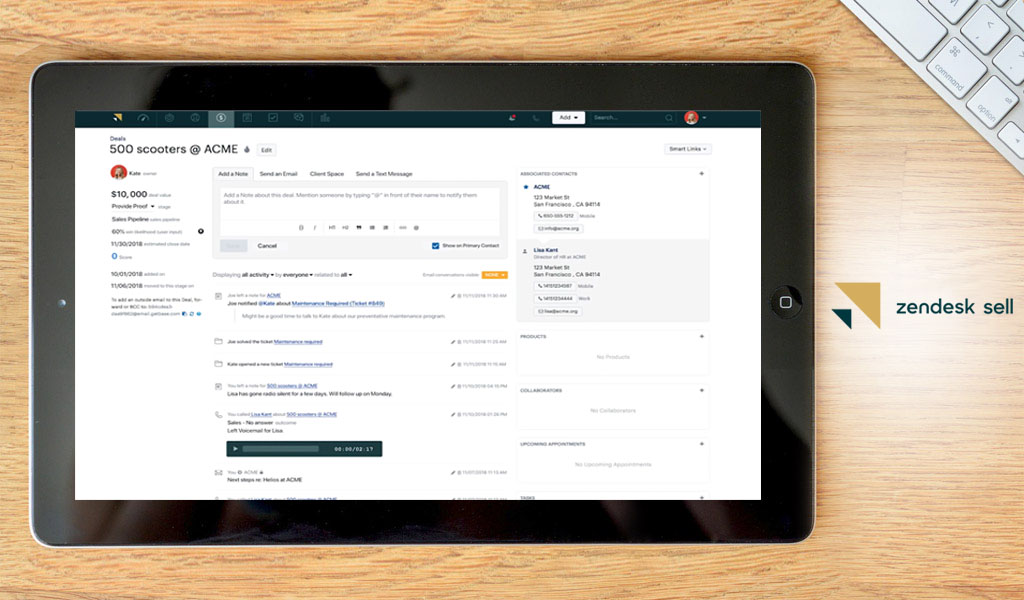
Zendesk Sell is another scalable CRM that is ideal for fast-growing businesses. It has core features to help you manage sales emails, calls, prospecting and sales reporting & analytics. Likewise, it has extensive apps and API integration, even allowing you to build an internal Zendesk app for deeper customization.
Startups can enhance the sales team’s productivity, streamline and automate sales workflows, pipeline visibility and, overall, shorten their sales cycle and increase revenues.
The software keeps track of all sales email communications, alerts you to reads or clicks off your website and lets you set up email automation.
Sales reps can also place calls within the app and log or record conversations for customer context. They can also target high-value prospects or discover opportunities from Zendesk Sell’s over 20 million business contacts and 200 million professionals in its database.
You can also drill down into details and analyze sales performance KPIs with the software’s powerful analytics. It features 20-plus chart types to help you visualize reports that make the most sense to you.
Zendesk Sell plans start at $19 per agent.
Detailed Zendesk Sell Review
10. vcita

vcita is a small business management app suitable for managing a CRM campaign. It has a built-in online payment, scheduling tool and marketing features.
Business users can manage client engagement in a central online hub and grow their customer database with vcita. It helps you drive leads from your website, mobile, email and social channels.
High-value leads can be labeled and sorted off your customer base. You can also get your leads’ big picture, such as past transactions, appointments, conversations, and other relevant details for the right context when pitching, upselling or cross-selling.
The app also helps you meet customer expectations by collaborating with your team when assigning clients, syncing work schedules, addressing customer concerns or fulfilling requests.
Key features include a client portal, appointment reminders, custom follow-ups, scheduling tool, billing & invoicing, lead website widget, and email or SMS campaign management.
Subscriptions start from $19 per month.
Detailed vcita Review
11. Salesmate

Salesmate helps to streamline your customer journey funnel with smart features. Its contact management feature provides a 360-degree view of your customers’ engagement, conversations and transactions across your pipeline.
It also can also import from Google, CSV/Excel files for contacts and leads, and its smart filters help you sort contacts in meaningful ways.
The software features a neat visual sales pipeline that lets you organize, sort, prioritize or drag and drop deals at whatever stage. Likewise, you can automate the next steps using a rule-based algorithm.
With notes, emails and activities linked to each deal, your team can collaborate on them with context and in real-time. The Salesmate sales pipeline also helps you forecast deal outcomes, thereby giving you the big picture of your sales pipeline’s health.
Meantime, task automation lets you organize a set of activities for the day using its smart queue tools, adding greater efficiency to the team’s sales workflows.
The software also features a smart email tool that syncs Salesmate with Gmail, Outlook, Yahoo and other IMAP services, affording you the convenience of sending and receiving emails between Salesmate and your email client. You can also track open or clicked emails for follow-up actions.
Other key features include built-in calling and SMS, auto-reminders, mobile CRM and customizations.
Pricing start at $12 per user/month.
Detailed Salesmate Review
12. Pipeliner

Pipeliner helps you target high-value prospects to greatly improve your win-loss rate. Sales managers, sales professionals and administrators will find its navigation and UI neat and easy to learn without much of a hassle as setting up one’s social media account.
The software has the essential features of a modern CRM, such as smart contact management, customization, a mobile CRM and email integration.
An account management stores your contacts’ information like past transactions, public data, engagement or preferred services with you, helping you personalize your messages. Likewise, Pipeliner’s lead management can help you sort potential clients among your contacts. An AI provides insights or key details to sales managers or reps so they can make smarter decisions on leads.
Pipeliner also features a mobile app that allows you to access or capture account and contact details on the go. You can collaborate with the sales team at the office even while you’re away at a conference or a client visit.
The software also features a smart calendar and task management, sales KPI dashboard and feeds.
Plans start at $65 per user/month.
Detailed Pipeliner Review
13. Zengine by WizeHive
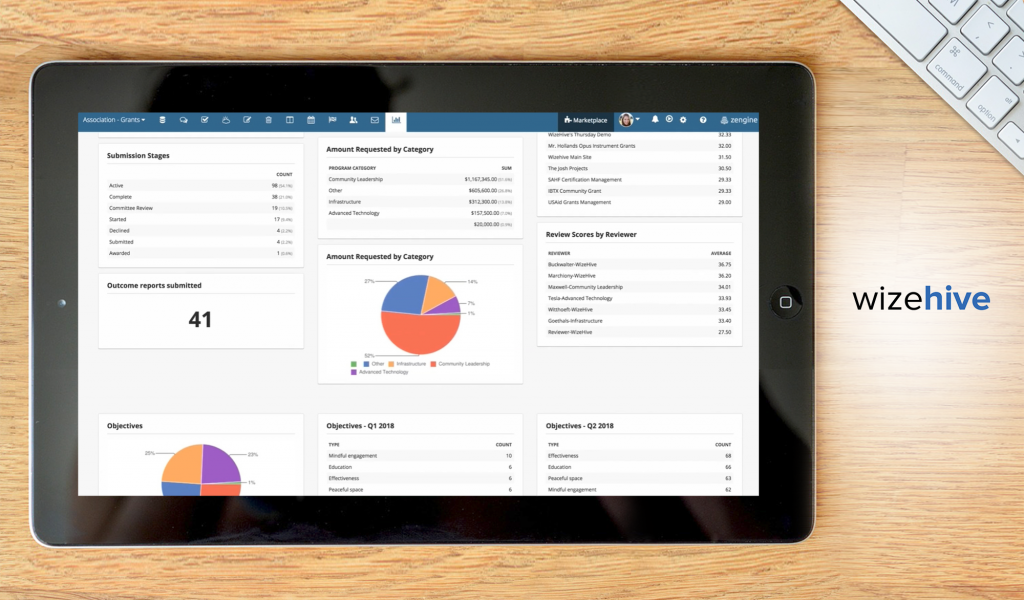
Zengine by WizeHive is lifecycle management software for mission-based organizations, helping them streamline their fellowship, award, grant, scholarship and similar solicitations. Employing CRM principles that are adaptive to nonprofits’ needs, the software has core features that help organizations engage grantors, funding institutions and benefactors with more personalized communication and track applications with greater visibility.
Nonprofits will find it easy to sort and monitor applications via Zengine’s submission portal. They can personalize questions to find mission-matched CSRs or any other benefactors.
You can assign applications to different reviewers based on metrics, while a custom scoring rubric adds a simple but insightful way to the assessment process.
Meanwhile, an administrative hub centralizes all data relevant to an application, including status checks. You can also customize a dashboard to display KPIs that matter to your selection criteria.
Zengine by WizeHive also features a plugin architecture for added functionalities, integration with key business tools like Salesforce and QuickBooks, and industry-grade security infrastructure.
Plans are based on pricing quotes to help you get a flexible, scalable platform for your needs.
Detailed Zengine by WizeHive Review
14. vtenext

vtenext helps marketing, sales and support manage CRM processes on a single location for greater context and consistency. As a result, you break down silos and provide customers with more personalized engagement.
Typical of a modern cloud-based CRM, vtenext features a sales funnel that ties together contacts, leads, deals, and activities. Sales reps can easily follow each deal’s or prospect’s status, helping them plan the next steps. Teams can also coordinate their customer-facing efforts, such as planning appointments, delivering tasks and exchanging conversations using a built-in chat.
Project leaders will find the software intuitive to agile, helping them assign tasks and track a project’s progress. Meanwhile, customer service agents can also use vtenext to manage tickets and track issues for faster resolution.
vtenext also features campaign management, a mobile app to help you take your project on the go and a customer portal to help them check their tickets in real-time.
Pricing is quote-based only.
Detailed vtenext Review
15. Daylite for Mac

Daylite for Mac is a small business CRM that’s ideal for startups with teams using Apple devices. It leverages the native Apple ecosystem, adding a layer of a seamless experience to manage clients, close more deals or complete projects. The CRM requires macOS 10.15.4 and iOS 14 or newer.
The software is designed to support and consolidate the team’s existing productivity tools, not create a new system. From calendars and alerts to emails and contact lists, Daylite for Mac integrates with Apple apps such as Apple Mail, Apple Calendar, Siri, Apple Contacts and more.
You can also customize lead pipelines, manage project tasks and organize clients lists to match your workflow.
The software also leverages the privacy, security and intuitiveness of the Apple platform, making this CRM adaptive to small business needs and budget.
Subscriptions start at $39.99 per user/month.
Detailed Daylite for Mac Review
Choose the Most-Fitting, not the Best, CRM for your Needs
Getting CRM software for startups is all about your workflow. Make sure the software adapts to your process and not the other way around. In most cases, your CRM is no different from other startups’. This means you want to look for scalable, flexible features, one that can take your company from small business to enterprise level.
Take a look at our top CRM for startups, HubSpot CRM, which should give you a good benchmark on the kind of software you might need. For further reading, our comparison guide on HubSpot CRM vs. Freshsales vs. Zoho CRM should lend to you more use case insights on arguably today’s top CRM apps for startups.

















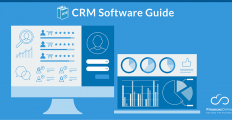













Leave a comment!